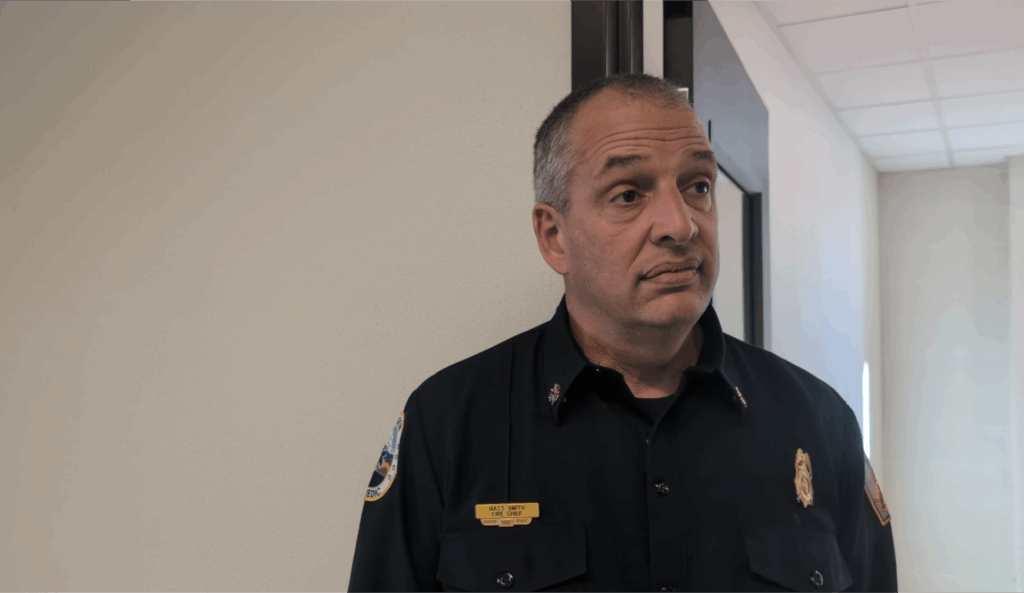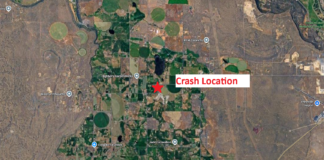
Prineville, Ore. – A proposal to grant Crook County Fire & Rescue Chief Matt Smith an approximate 8% raise was rejected by the majority of the district’s elected board during its public meeting on Friday, months after a independent third-party report that revealed internal allegations about leadership problems and an ongoing wave of resignations among district staff.
The raise was proposed by Board President Dennis Merrill but faced strong opposition from fellow directors Gary Abrams and George Ponte, as well as concerns from Director Steve Lent. Both Abrams and Ponte voiced concern that the 8% increase would be unfair to rank-and-file firefighters, who reportedly last received an approximately 3.5% wage increase. Abrams and Ponte argued that any raise for the chief should be equitable and in line with the compensation increases awarded to other personnel.
According to Merrill’s statements, Smith’s current base salary is $144,841. His proposal also would have included increasing additional compensation benefits to $5,475, bringing Smith’s total salarey and compensaiton to $161,903 under his proposed motion.
While not as firmly opposed to Merrill’s proposal, Lent said he felt the proposed 8% raise was too high.
“Well I just have an issue with the 8%, it does seem really high, and I know we want to keep it at a certain level, but I don’t know what every other organization—how much they are raising theirs,” said Lent. “It just seems high.”
Board Vice President Jerry Brummer was absent from the meeting, marking his second absence in as many days after also missing a special session of the Prineville City Council, on which he currently serves. Brummer resigned from the Crook County Board of Commissioners in late 2023 citing health reasons.
In further stating his case against the proposed 8% increase, Abrams also stated during discussion that Smith reportedly was already given a 10% raise last year.
With the other board members indicating during discussion that they would be instead be open to approving a 4% raise on both the base salary, several directors asked Merrill if he would consider amending his motion to reflect that compromise. Merrill declined, insisting on the original 8% proposal.
“I don’t want to make an amendment,” said Merrill, despite the other directors already signaling they were
As a result, the motion went to a vote and was defeated with nay votes by Abrams, Ponte, and Lent. Merrill was the only yay vote for his motion.
Immediately after the vote, another Abrams introduced a motion to approve a 4% raise for Chief Smith which recieved a second by Lent. That motion passed with yay votes by three of the Directors, with Merrill voting against it.
Both Abrams and Ponte are the only two board members who have worked as firefighters. Two current firefighters privately praised both Abrams and Ponte’s board leadership while speaking to the Prineville Review in their personal capacity, and under the condition of anominity as they feared retribution.
The decision now brings Smith’s annual base salary to $150,635.
The vote follows a period of heightened scrutiny over district leadership, stemming from a critical internal report called an “organizational assessment” presented to the board late last year. The report, conducted by the consulting firm Rafilson & Associates, LLC, raised concerns about internal communication, workplace culture, and staff retention.
Although the report was discussed during a public board meeting, Crook County Fire & Rescue failed to provide proper notice to the Prineville Review as required under Oregon’s public meetings law—despite issuing notices for every other board meeting since being informed last summer that such notification was legally required. While the legal responsibility ultimately rests with the elected board, Smith had been in charge of making notices to the public, interested persons, and representatives of the news media.
The CCFR later admitted to failing to provide the required notice in response to a formal public meetings grievance submitted under a new Oregon transparancy law involving the Oregon Government Ethics Commission.
The law came about after public concern over a growing number of issues of public meetings compliance by public bodies, both large and small, across Oregon.
The leadership concerns became public shortly after when Battalion Chief Dan Drayton made a surprise resignation during a public meeting. In his prepared remarks, Drayton cited “systemic leadership and retention issues” and directly referenced the contents of the report.
“This level of turnover is not normal, nor does it have to be inevitable. It reflects systemic issues that must be addressed for the organization to thrive,” said Drayton. “While there have been positive improvements during my tenure, the persistence of these issues suggests the need for a fresh perspective.”
His resignation drew community attention and was followed by the departure of a lieutenant, who reportedly resigned over similar concerns with district leadership.
The organizational assessment also highlighted that issues of turnover were a “consistent theme” brought up during review of CCFR and staff interviews.
“High turnover emerged as a consistent theme during the document review and interviews. While the department lacks a formal exit interview process or reliable data on reasons for departures, feedback from command rank, lieutenants, and line staff suggests a perceived culture of control is likely a significant factor,” the report stated.
The report also detailed widespread frustration among frontline personnel over limited advancement and lack of input in department decisions, stating: “A significant concern voiced by line staff and lieutenants is the absence of growth opportunities within the department. Many feel that leadership retains too much control, which prevents lower-level members from contributing meaningfully to decisionmaking or leadership roles, resulting in a loss of valuable frontline expertise.”
Construtive feedback as well as the highlighting of positive areas of its review were included in the report, including the fire chief and board’s strategic planning for growth, stating that the “The Fire Chief and Board have proactively planned for community growth and industrial development, including new industries like data centers.”
“Members value leadership’s flexibility in accommodating personal situations,” the report also stated. You can read the full copy of the report here.
The issues are not the first time criticism from rank-and-file firefighters have been raised against Smith.
In 2019, a ruling determined that the CCFR violated the Public Employee Collective Bargaining Agreement, according to reporting from KTVZ. The legal complaint said that firefighters alleged that Smith had also discouraged employees from forming a union in the first place.
Following the order the union had said, “Chief Smith has shown a consistent disregard for his obligations under the law and this … final order is just the latest example of his unwillingness to comply with his obligations and learn from his mistakes.” It had also called for a vote of no confidence at the time against Smith, according to a 2019 document obtained by the Prineville Review.
Multiple attempts since December seeking comment from Chief Smith on the matter have all been declined, although Smith did speak to us regarding a seperate matter involving the potential annexation of Juniper Acres by the Alfalfa Fire District which sits on the border of Crook and Deschutes county. Smith initial response was that he didn’t think he wanted to speak to us when we asked following Drayton’s resignation and the discovery of the unnoticed meeting discussing the organization assessment.
Smith was again offered an opportunity during its public meeting to reach out to comment yesterday, as were all board members.
Friday’s board action highlighted ongoing divisions among directors over how to respond to the leadership report and rebuild trust within the district. While some board members appear to be calling for stronger accountability measures and closer alignment with staff concerns, others continue to more strongly back Chief Smith and defend his current role and compensation.
Mr. Alderman is an investigative journalist specializing in government transparency, non-profit accountability, consumer protection, and is a subject matter expert on Oregon’s public records and meetings laws. As a former U.S. Army Military Police Officer, he brings a disciplined investigative approach to his reporting that has frequently exposed ethics violations, financial mismanagement, and transparency failures by public officials and agencies.





